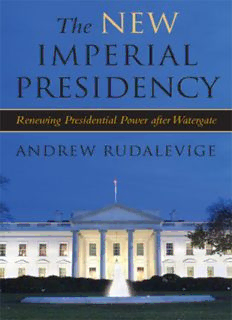
The New Imperial Presidency: Renewing Presidential Power after Watergate (Contemporary Political and Social Issues) PDF
Preview The New Imperial Presidency: Renewing Presidential Power after Watergate (Contemporary Political and Social Issues)
The New Imperial Presidency The New Imperial Presidency Renewing Presidential Power after Watergate A ndrew Rudalevig e The University of Michigan Press Ann Arbor First paperback edition 2006 Copyright © by the University of Michigan 2005 All rights reserved Published in the United States of America by The University of Michigan Press Manufactured in the United States of America cPrinted on acid-free paper 2009 2008 2007 2006 5 4 3 2 No part of this publication may be reproduced, stored in a retrieval system, or transmitted in any form or by any means, electronic, mechanical, or otherwise, without the written permission of the publisher. A CIP catalog record for this book is available from the British Library. Library of Congress Cataloging-in-Publication Data Rudalevige, Andrew, 1968– The new imperial presidency : renewing presidential power after Watergate / Andrew Rudalevige. p. cm. — (Contemporary political and social issues) Includes index. isbn-13: 978-0-472-11430-6 (cloth : alk. paper) isbn-10: 0-472-11430-1 (cloth : alk. paper) 1. Presidents—United States—History—20th century. 2. Presidents—United States— History—21st century. 3. Executive power—United States— History—20th century. 4. Executive power—United States—History— 21st century. 5. United States—Politics and government—1945–1989. 6. United States—Politics and government—1989– I. Title. II. Series. jk511.r83 2005 973.92—dc22 2005007415 isbn-10: 0-472-03192-9 (pbk. : alk. paper) isbn-13: 978-0472-03192-4 (pbk. : alk. paper) To Christine, Eliza, & Owen; & to Suzanne & Donald Rudalevige with love and thanks A d id quod ne timeatur fortuna facit minime tuti sunt homines. (Men are least safe from what success induces them not to fear.) —Livy PREFACE & ACKNOWLEDGMENTS T he ‹rst version of this book took shape in my mind before September 11, 2001, but it was largely written after the mass murders of that day. The American reaction to September 11 has of course been extensive. Furthermore, both in formulation and execution, it has been driven largely by the presidency. The authority exercised by President George W. Bush, both granted by legislative action and claimed beyond those grants—for instance, to unilaterally designate American citizens as “enemy combatants” out of reach of the judicial system or the Consti- tution—was astonishing in its scope. Presidential assertiveness, and leg- islative deference, seemed at unprecedented levels. Perhaps this was fair enough in the wake of events that had “changed everything.” Yet it struck me that these developments also ›owed natu- rally, if at a quicker pace and higher volume, from other aspects of recent American history—speci‹cally the ebbs and ›ows of presidential power leading up to and away from the Vietnam/Watergate era. Back in 1973 the historian Arthur M. Schlesinger Jr. had af‹xed an enduring adjective to the Nixon presidency: it was, he said, “imperial.” This didn’t mean that the president literally had become emperor, as some anti-Federalist authors had feared back in the 1780s. But it did suggest both that the occupant of the of‹ce exercised more absolute power over more issues than the constitutional framework suggested and, more broadly, that the of‹ce itself had expanded in its power relative to other governmental actors. The presidency had breached old boundaries, bringing more and more authority over more and more aspects of American governance under its control.
Description: